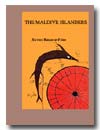| Editorial
16 January 2006

Royal Tick for Tourism:
This web site does not support any selective or blanket boycott
of Maldive tourist resorts. Such measures usually penalise only
the poor. A selective boycott leaves open the opportunity to
extort protection money.
 |
In a media release of
14 January, the Maldive government's chief spin-doctor Mr. Mohamed
Shareef condemned what he stated as the Maldive opposition’s
call for 'civil unrest and public uprising'.
On this issue our editorial team feel that we have to agree with
Mr. Shareef, albeit with some reservations. Orchestrating civil
unrest is not the model for democratic action, particularly for
the Maldives which is acutely dependent on stability and tranquillity
to be able to preserve the hospitality industry; the mainstay of
the Maldives’ economic development.
While the Maldivian Democratic Party (MDP) is keen to assert the
right to freedom of expression and assembly guaranteed to its membership
by the Maldive constitution, it does not seem to realise that every
right comes with a responsibility in a democratic society. Article
21 of the International Covenant on Civil and Political Rights qualifies
the right of peaceful assembly and states that “[t]he right
of peaceful assembly shall be recognised. No restrictions may be
placed on the exercise of this right other
than those imposed in conformity with the law and which are necessary
in a democratic society in the interests of national security or
public safety, public order (ordre
public), the protection of public health or morals or the protection
of the rights and freedoms of others.”Update:
Just minutes before 1 am Maldives time on January 19th,
the MDP's government-in-waiting backed away from ahimsa.
They failed to heed the request of the first MDP ahimsa
demonstration for them to join in to be arrested in rows of five,
as per their manual. This web site congratulates the MDP
leadership for choosing the democratic option on this occasion.
It is well-known, however, that the MDP pays scant regard to international
instruments on human rights. Section 3.3 of its Rules of Procedure
(provisional constitution) is a direct affront to Article 18(1)
of the International Covenant on Civil and Political Rights.
This web site is based in New Zealand and we know that unlawful
assembly in this country (assuming police authorisation will be
granted for orderly assembly) similar to what is now taking place
in the Maldives will result in police action against demonstrators.
As we are not firsthand witnesses to police action in the Maldives
we cannot, however, judge whether or not its magnitude, proportionality
and modus operandi are commensurate with the scale of unrest
and comparable to those in this country in similar circumstances.
New Zealand Ministry of Justice Guidelines on the New Zealand
Bill of Rights Act 1990: A Guide to the Rights and Freedoms in the
Bill of Rights Act for the Public Sector, referring to Section
16 of the Act states that restrictions on the right to assemble
may be permissible if they:
-
serve a legitimate
interest,
-
are no more than
what is necessary to protect that interest, and
-
clearly contemplate
the person's right to continue to assemble peacefully where
possible; that is, the restrictions must not effectively negate
the right if other options are available.

The Apartheid era South African Springbok rugby tour to New
Zealand 1981: Riot police in full gear stand in line before
a baton charge on demonstrators. Many of those arrested were
charged and convicted of unlawful assembly. |
If this guideline were applicable in the Maldives we feel that the
Maldive police would be justified in enforcing restrictions on unauthorised
and unruly assembly in public places.
The opposition has the democratic option of winning elections at
the ballot box. This was demonstrated by recent parliamentary by-elections
in the Maldives, in which the MDP won two out of the three seats
contested.
There
are signs that the MDP is weakening in its resolve to implement
its long-threatened campaign of civil disobedience. From recent
remarks made by its top leadership, one would have thought that
the Gandhian style campaign of ahimsa was to kick-off in
earnest as early as this week. One has to wonder how the campaign
could be one of ahimsa when police vehicles are upturned
and set on fire.
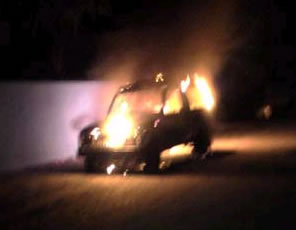
Police vehicle on fire in Addu Atoll. Similar attacks on public
property took place in 1958 on the eve of the declaration
of the breakaway United Suvadive Islands Republic in Addu,
Fua Mulaku and Huvadu atolls. Ironically, other than in Malé,
the current anti-government activities are also based largely
in these three atolls. |
The
only action that ensued from an emergency meeting of the MDP's politburo
was the formation of a committee to determine how to conduct collective
demonstrations involving the entire party. Other than the comic
value of the politburo resolution, which was a poor, ungrammatical
attempt at mimicking ancient royal decrees, it was a case of assigning
the matter into the “too-hard basket”.
This was an interesting development, especially at a time when the
MDP leader may be holding negotiations with the Maldive president
of the republic under Commonwealth auspices at an undisclosed overseas
venue.
| 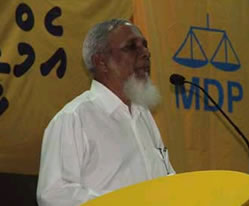
Mullah Adam Naseem, president of the MDP's council of mullahs.
He was the person who threw his hands in the air and invoked
curses from Allah upon seeing Maldive women soldiers on parade
for the first time in the early 1990s. Given half a chance
he would condemn most people in his party's top leadership
to be whipped for drinking alcohol and stoned for having extramarital
sex. How long can such uneasy bedfellows work together without
the benefit of a gimmick such as ahimsa? A good question
is whether or not the mullahs would tolerate emulating a faecal
idolater (najis mushrik) such as Mohandas Gandhi.
They might want to call the MDP street riots an intifada.
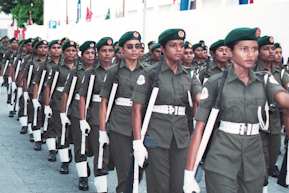
|
One has to ask why the leadership of
the MDP has opted for the undemocratic alternative of street riots
and damage to public property.
Admittedly it is too unrealistic to hope to win the next presidential
election due in 2008 because the current parliament that would
nominate the single candidate for a plebiscite is stacked in favour
of the incumbent president of the republic. Nevertheless the parliamentary
general elections would follow in less than a year, and a party
that commands such resounding support as claimed by the MDP ought
to be confident of winning an overwhelming majority to enable
them to move a successful vote of no confidence against the president
of the republic. This is only three years away and this length
of time is necessary for the party to consolidate itself and gain
political maturity.
The only explanation for the MDP's hasty and undemocratic approach
is that the party is not really the unified organisation that
it purports itself to be. It does not have a set of cohesive policies
and was unable to agree on a permanent party constitution as planned
last month.
The MDP is a hotchpotch of begrudged individuals and factions
made up of failed business people, their extended families, ditched
government officials, and raving jihadi mullahs who are
simply a united front with a single cause; the ousting of Mr.
Gayoom at any cost. They do not seem to care about the damage
that they would inflict on livelihoods or the toll that they would
wreak on what was once the fastest growing economy in southern
Asia.
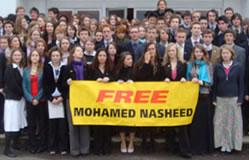 I say old chap! Mufti-clad
pupils of an expensive British independent school campaign
for the release of their Maldive old boy.They paid £20,160
(exclusive of charges) to attend in 2005-6. Its address
is in West Lavington, but is definitely not struggle street
I say old chap! Mufti-clad
pupils of an expensive British independent school campaign
for the release of their Maldive old boy.They paid £20,160
(exclusive of charges) to attend in 2005-6. Its address
is in West Lavington, but is definitely not struggle street
|
The real leaders and bankrollers of the
MDP are not average battlers from struggle street. Some of them
have amassed incredible amounts of wealth through dubious means
while in top positions of the regime that they now wish to replace.
Others enjoyed enormous commercial advantages while collaborating
with those whom they have now fallen out with. When the going
gets tough they would fall back on their slush funds and off-shore
accounts while enjoying a swim in their penthouse swimming pools.
These people are comfortably hedged against any economic turmoil
while it is their foot soldiers and their families who would suffer.
The MDP leadership knows that if they hang around for three years
for the sake of what they believe to be quaint democratic niceties,
sooner rather than later, the cookie will crumble and not necessarily
how they expect.
Given these facts, Gandhian-style ahimsa, as opposed
to Western-style democracy, suddenly becomes a rational option.
A few
hours after this editorial was uploaded, the MDP published
a set of Procedures
for Peaceful Protest. Some
of the procedures have to be noted with interest, if not
a degree of cynical amusement:
- A demonstration must
be carried forth in a manner that does not necessitate
the participation of the Party’s main leaders.
(Are they afraid of
arrest? Gandhi was never afraid of arrest and never
left the dirty work for others. He was always the first
to be arrested. (See
further down)
- National level demonstrations
or gatherings shall be organised and carried out by
the National Executive Committee. A date for such a
demonstrations or gatherings shall be determined at
a later date. (Yes,
that one remains in the "too-hard basket"!)
- Every Party demonstration
must begin with at least 25 members who are willing
to be arrested. These 25 members shall stand in rows
of five, arms linked, as an all set arrest-line. When
the police move against the demonstration, each arrest-line
shall move forward and be arrested. (How
can they be sure that the police will arrest these five
people instead of others. Do they have an arrangement
with the police as to how arrest should take place?)
- If the Party flag
falls down and is not re-hoisted for an hour, the protest
shall be deemed over. (This
gives the police an effective clue as to how to end
each protest within an hour)
It looks
like these procedures were drafted by someone well versed
in tribal combat of the type that one reads in the Biography
of Mohamed as written by ibn Ishaq and translated into Divehi
by Hussain Salahuddine. In such combat, battle lines are
drawn and warriors from opposing sides come to the middle
to have duels according to ancient rules. Everyone (at least
the idolaters) respected those rules and none of the sides
appeared in full riot gear, armed with tear-gas.
That reminds one of the Maldive pseudo-mullah who went to
Beirut, Lebanon at the height of the civil war there in
the early 1980s. Having finally been blessed with a visit
to the Holy Arab motherland in the throes of jihad
against infidel Christians and Jews, the pseudo-mullah asked
a sympathetic Maldive student at the local American University
to show him where the holy war was being fought. He was
shown the flying missiles and the armed militia, wielding
kalashnikovs. The man was not satisfied. He was adamant
that such holy combat would be transacted as described in
Salahuddine's "Siyarathu".
The Maldive mind has obviously not progressed since Salahuddine's
day or the early 1980s.
The the Divehi
language document and the English translation of this clause
differ. This is a feature of both Maldive government and
opposition publications. What is published for a foreign
audience is often different from what is available to the
general Maldive public. It is possible that the Divehi language
clause was hastily changed as a result of criticism from
the party's grassroots. The following are the English and
Divehi versions of the clause:
Example: The
peaceful protest at the Male’ Republican Square
on 13 January 2006 was led by the President of the Male’
Province and Special Majlis MP for Male’, H. Fohdhooge’,
Mohamed Nasheed. Nasheed led the protest until the arrival
of the Star Force. After that many protestors felt the
Party leader should have taken over from Nasheed. However,
this procedure does not seem to be the most beneficial
to the Party. Party leader and Cabinet Members shall not
join a demonstration in its inception. But when it is
established. A demonstration must be carried forth in
a manner that does not necessitate the participation of
the Party’s main leaders. Every member elected to
this Party’s Branch Executive Committees has the
capacity to lead a demonstration. (from Minivan News:
16 January 2006).
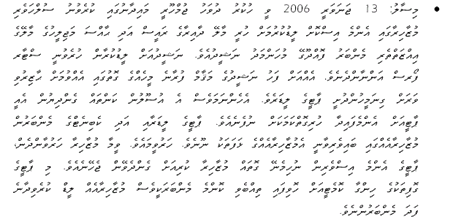
|
|




 rss feed
rss feed 
